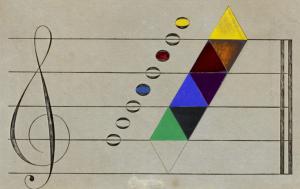I am a Strange Loop -
Can thought arise out of matter? Can self, soul, consciousness, `I` arise out of mere matter? If it cannot, then how can you or I be here?
|
Sunday, 19 May 2019
quote [ Understanding the same laws to apply to both visual and aural beauty, David Ramsay Hay thought it possible not only to analyse such visual wonders as the Parthenon in terms of music theory, but also to identify their corresponding musical harmonies and melodies. Carmel Raz on the Scottish artist's original, idiosyncratic, and occasionally bewildering aesthetics. ]
You might think I'm crazy, but I don't even care
|
Comments
|
moriati said @ 1:44pm GMT on 19th May
“We know, however, that the mind is capable of understanding these matters in all their complexity and in all their simplicity. A ball flying through the air is responding to the force and direction with which it was thrown, the action of gravity, the friction of the air which it must expend its energy on overcoming, the turbulence of the air around its surface, and the rate and direction of the ball's spin. And yet, someone who might have difficulty consciously trying to work out what 3 x 4 x 5 comes to would have no trouble in doing differential calculus and a whole host of related calculations so astoundingly fast that they can actually catch a flying ball.
People who call this "instinct" are merely giving the phenomenon a name, not explaining anything. I think that the closest that human beings come to expressing our understanding of these natural complexities is in music. It is the most abstract of the arts - it has no meaning or purpose other than to be itself. Every single aspect of a piece of music can be represented by numbers. From the organization of movements in a whole symphony, down through the patterns of pitch and rhythm that make up the melodies and harmonies, the dynamics that shape the performance, all the way down to the timbres of the notes themselves, their harmonics, the way they change over time, in short, all the elements of a noise that distinguish between the sound of one person piping on a piccolo and another one thumping a drum - all of these things can be expressed by patterns and hierarchies of numbers. And in my experience the more internal relationships there are between the patterns of numbers at different levels of the hierarchy, however complex and subtle those relationships may be, the more satisfying and, well, whole, the music will seem to be. In fact the more subtle and complex those relationships, and the further they are beyond the grasp of the conscious mind, the more the instinctive part of your mind - by which I mean that part of your mind that can do differential calculus so astoundingly fast that it will put your hand in the right place to catch a flying ball- the more that part of your brain revels in it. Music of any complexity (and even "Three Blind Mice" is complex in its way by the time someone has actually performed it on an instrument with its own individual timbre and articulation) passes beyond your conscious mind into the arms of your own private mathematical genius who dwells in your unconscious responding to all the inner complexities and relationships and proportions that we think we know nothing about. Some people object to such a view of music, saying that if you reduce music to mathematics, where does the emotion come into it? I would say that it's never been out of it.” Douglas Adams, Dirk Gently's Holistic Detective Agency |
Post a comment
[note: if you are replying to a specific comment,
then click the reply link on that comment instead]You must be logged in to comment on posts.

